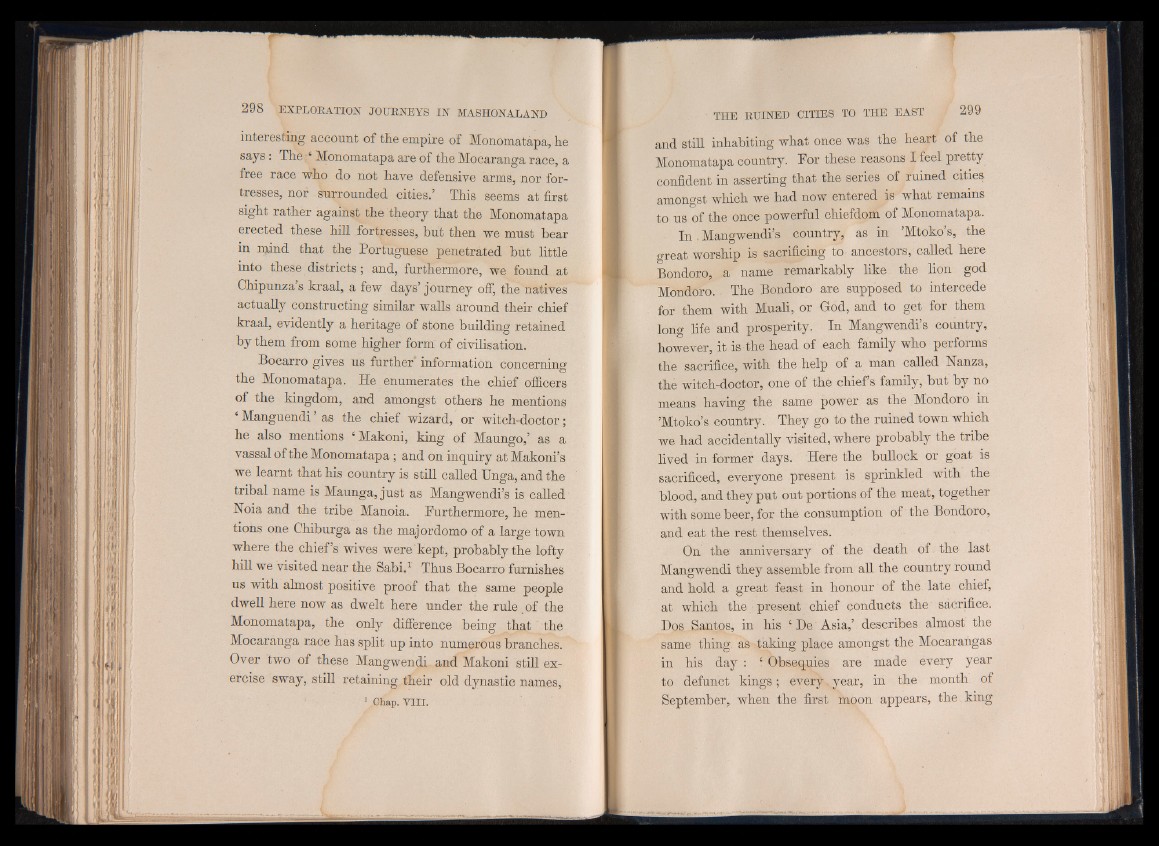
interesting account of tlie empire of Monomatapa, he
says : The; ‘ Monomatapa are of the Mocaranga race, a
free race who do not have defensive arms, nor fortresses,
nor surrounded cities.’ This seems at first
sight rather against the theory that the Monom,atapa
erected these hill fortresses, but then we must bear
in mind that the Portuguese penetrated but little
into these districts; and, furthermore, we found at
Chipunza s kraal, a few days’ journey off, the natives
actually constructing similar walls around their chief
kraal, evidently a heritage of stone building retained
by them from some higher form of civilisation.
Bocarro gives us further information concerning
the Monomatapa. He enumerates the chief officers
of the kingdom, and amongst others he mentions
‘ Manguendi as the chief wizard, or witch-doctor;
he also mentions ■ Makoni, king of Maungo,’ as a
vassal of the Monomatapa; and on inquiry at Makoni’s
we learnt that his country is still called IJnga, and the
tribal name is Maunga, just as Mangwendi’s is called
Noia and the tribe Manoia. Purthermore, he mentions
one Chiburga as the majordomo of a large town
where the chief’s wives were kept, probably the lofty
hill we visited near the Sabi,1 Thus Bocarro furnishes
us with almost positive proof that the same people
dwell here now as dwelt here under the rule of the
Monomatapa, the only difference being that the
Mocaranga race has split up into numerous branches.
Over two of these Mangwendi and Makoni still exercise
sway, still retaining their old dynastic names,
1 Chap. VIII.
and still inhabiting what once was the heart of the
Monomatapa country. Por these reasons I feel pretty
confident in asserting that the series of ruined cities
amongst which we had now entered is what remains
to us of the once powerful chiefdom of Monomatapa.
I n . Mangwendi’s country, as in ’Mtoko’s, the
great worship is sacrificing to ancestors, called here
Bondoro, a name remarkably like the lion god
Mondoro. The Bondoro are supposed to intercede
for them with Muali, or God, and to get for them
long life and prosperity. In Mangwendi’s country,
however, it is the head of each family who performs
the sacrifice, with the help of a man called Nanza,
the witch-doctor, one of the chief’s family, but by no
means having the same power as the Mondoro in
’Mtoko’s country. They go to the ruined town which
we had accidentally visited, where probably the tribe
lived in former days. Here the bullock or goat is
sacrificed, everyone present is sprinkled with the
blood, and they put out portions of the meat, together
with some beer, for the consumption of the Bondoro,
and eat the rest themselves.
On the anniversary of the death of the last
Mangwendi they assemble from all the country round
and hold a great feast in honour of the late chief,
at which the present chief conducts the' sacrifice.
Dos Santos, in his ‘ De Asia,’ describes almost the
same thing, as taking place amongst the Mocarangas
in his day : ‘ Obsequies are made every year
to defunct kings; every .. year, in the month of
September, when the first moon appears, the king